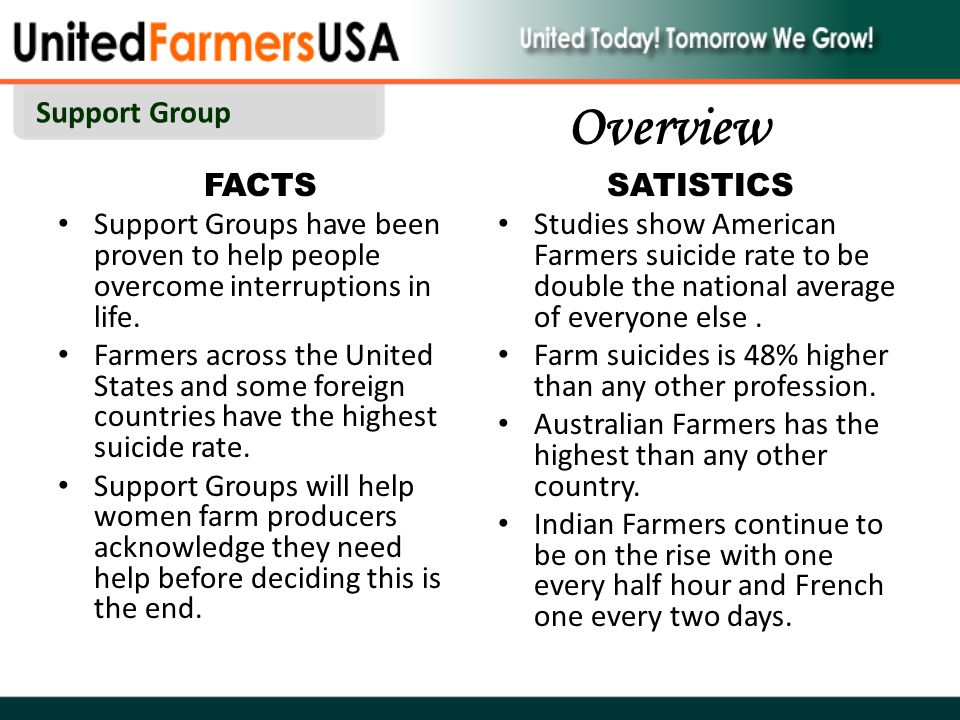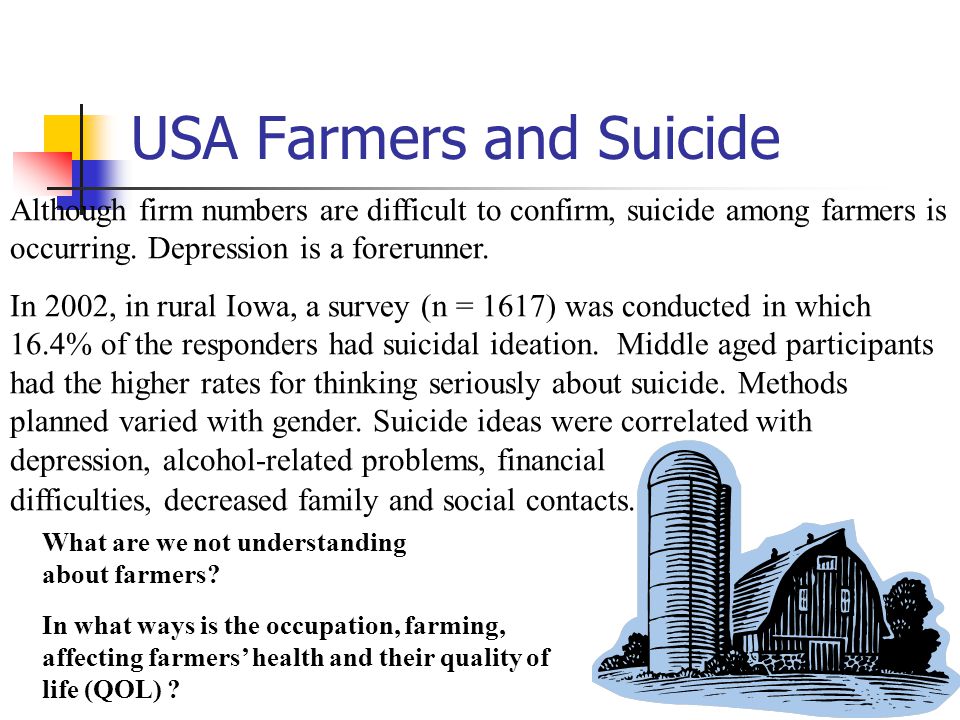USA Farmers in America are killing themselves in staggering numbers – Also Australian Farmers committing Suicide
(005875.811-:E-000062.43:N-AC:R-SU:C-30:V)
[I am wondering whether “Globalism” is deliberately destroying white farmers? I heard years ago that farms in the USA had fallen greatly in number over the decades. “(((Globalism’s)))” ability to destroy privately owned farms is the same as what I have witnessed here in South Africa with regard to (((corporations))) destroying smaller businesses. You just can’t compete with these big businesses.
The reason these farmers are committing suicide is because their ability to earn money is being destroyed. Note that this is also happening in Australia. I’m also putting up an older article from 2013 where this problem was already evident.
The war against farmers started in the Soviet Union as a result of the Jewish Bolshevik revolution in 1917. I can’t help but wonder whether this war is carrying on by other means. Jan]
Here are statistics I found for Australia where farmer suicide is also a problem. In the chart below you can see that clearly farmers are committing suicide at an abnormal rate:

This chart from Australia shows that suicide is NOT age related! Young farmers are also committing suicide. Clearly something is very wrong:

Farmers in America are killing themselves in staggering numbers
“Think about trying to live today on the income you had 15 years ago.” That’s how agriculture expert Chris Hurt describes the plight facing U.S. farmers today.
The unequal economy that’s emerged over the past decade, combined with patchy access to health care in rural areas, have had a severe impact on the people growing America’s food. Recent data shows just how much. Farmers are dying by suicide at a higher rate than any other occupational group, according to the Centers for Disease Control and Prevention (CDC).
The suicide rate in the field of farming, fishing and forestry is 84.5 per 100,000 people — more than five times that of the population as a whole. That’s even as the nation overall has seen an increase in suicide rates over the last 30 years.
The CDC study comes with a few caveats. It looked at workers over 17 different states, but it left out some major agricultural states, like Iowa. And the occupational category that includes these workers includes small numbers of workers from related occupational groups, like fishing and forestry. (However, agricultural workers make up the vast majority of the “farming, fishing and forestry” occupational group.)
Source: http://camelotdaily.com/farmers-america-killing-staggering-numbers/
Article from 2013 about American farmers killing themselves in record numbers:
WHAT’S NEXT?
Since 2013, net farm income for U.S. farmers has declined 50%. Median farm income for 2017 is projected to be negative $1,325. Most commodity prices remain below the cost of production. There is a direct correlation between farm economics and farmer mental health. And as our current farm recession deepens, farmer suicides will continue to increase.
Since the publication of our article Why are American farmers killing themselves in record numbers? (published on December 6th, 2017 in The Guardian), we’ve heard from many people wondering how to help.
We have two suggestions:
1) Make an end-of-year donation to an organization that works directly with farmers (Scroll down for a list of organizations working on the front lines of farmer behavioral health. If you have an organization to add to this list, please add in the comments section below.
2) Contact your elected officials to demand that farmer behavioral health programs be funded in the 2018 Farm Bill.
Today, only 1% of our population is farming, which means fewer voices demanding change, but we as consumers can amplify their voices. We can reach out to our elected representatives and ask that farmers and their wellbeing be prioritized in state and national agendas. As discussions get underway for the 2018 Farm Bill, now is the time to ask for federal support for agricultural behavioral health programming.
Scroll down for some sample email, social media, and phone call scripts to get the ball rolling. Please also feel free to share the Guardian article with your elected officials. Let’s lift our voices together in support of the foundation of our food system: our farmers.
ORGANIZATIONS TO SUPPORT
AgriWellness was co-founded by Dr Mike Rosmann, featured in the article, and ran the Sowing Seeds of Hope program for nearly 15 years. Their mission is to promote accessible behavioral health services for underserved and at-risk populations affected by rural crisis in agricultural communities. This non-profit organization could use your financial support. AgriWellness, Inc. is a 501c3 nonprofit organization that is incorporated in Iowa. AgriWellness has a bank account at Shelby County State Bank in Harlan, Iowa. Donations may be made out to AgriWellness, Inc., in care of Dr. Michael Rosmann, 1027 1400th St., Harlan, IA 51537. All donations will be acknowledged by letter. They are working on creating a donation button as well.
FarmAid works year-round to build a system of agriculture that vlaues family farmers, good food, soil and water, and strong communities. If you need to talk to someone directly, we are here to listen. You can call our farmer hotline at 1-800-FARM-AID (1-800-327-6243). Joe and other Farm Aid staff answer the hotline Monday through Friday from 9:00 a.m. to 5:00 p.m. eastern time.
Rural Response Hotline (Nebraska)
Nebraska’s Rural Response Hotline has provided information and assistance to individuals and families throughout rural Nebraska for over twenty years. The Hotline is a vital resource for individuals and families who are feeling overwhelmed with stress, depression, or other mental health related issues.
Newly announced series of workshops for 2018 – Down on the Farm: Supporting Farmers in Stressful Times is a free, three hour workshop that will help you recognize and respond when you think a farmer or farm family member might need help.
Source: http://www.femalefarmerproject.org/news-more/2017/12/7/the-us-farmer-suicide-crisis
White Shop:Against Our Better Judgment: The Hidden History of How the U.S. Was Used to Create Israel
Prodigiously documented Alison Weir must be highly commended for throwing such a brilliantly hard light on the relationship between the United States and Israel. I hope this marvelous book gets all the attention it deserves. Ambassador Andrew Killgore
Video: Do Jews make you INSANE? The Assassination of the Jew Allard Lowenstein: Part 2
We examine closely the strange insanity that befell the young white man Dennis Sweeney who killed Allard Lowenstein. I dig into a story that has been largely forgotten.
S.Africa: Black man has sex with his 3yo Granddaughter
The Black guy said that this was cheaper than paying a prostitute! WTF? Read it for yourself!



